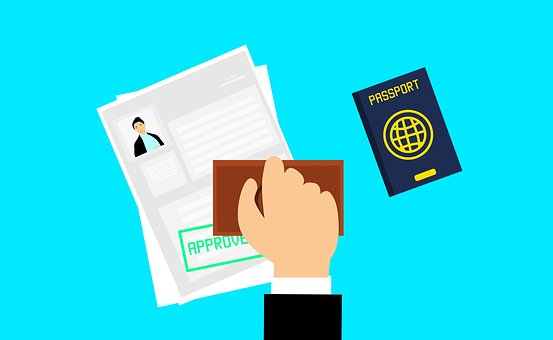Riding the Wave, 17. Becoming a Citizen.
Why did the United States enter World War II? Name one thing the Constitution does. What is the rule of law? Many documents influenced the U.S. Constitution. Name one. Why do U.S. representatives serve shorter terms than U.S. senators? What is one part of the judicial branch? There are four amendments to the U.S. Constitution about who can vote. Describe one of them. The Federalist Papers supported the passage of the U.S. Constitution. Name one of the writers.
Could you answer them all correctly? Congratulations, if you meet all the other criteria, you can now become a United States citizen. You will probably also know more about your adoptive country than many native-born Americans. Thanks to the present incumbent's hatred of people like his parents and grandparents, who came from other countries, it has become even more difficult to become a citizen.
To become a citizen, you must: be of good moral character (I assume this means you haven't been arrested), have been a permanent resident during at least five years, have not left the United States for a period of more than one year during that time, and know basic English. You must fill out applications, get a biometric (whatever the hell that is), pass an interview where your English will be tested, and pass a Civics exam. The filing fee is $640, and the fee for the biometrics is $85.
The questions for the civic exam are online, and consist of 128 questions, some with more than one acceptable answer. They are not multiple choice, so one must have a good memory. The exam consists of a total of 20 questions out of the 128. Twelve must be answered correctly to pass. Whereas the English required is basic, the English necessary to study and understand is not. The truth is, most Americans probably can't answer many more than twelve questions out of that list correctly.
To become a Spanish citizen, there is also an exam to study for. It's administered by the Instituto Cervantes. If you think the American version is bad, the Spanish version is even worse. There are five sections, with ten, three, two, three, and seven questions in each respective section. The sections deal with different areas of Spanish history, civics, and society. One question might be, Como se llamen los órganos de gobierno de la Comunidad Autónoma de Canarias? a)Cabildos. b)Consejos Insulares. c)Diputaciones. (What are the governing agencies called in the Autonomous Region of the Canary Islands?). Or, perhaps, Se puede ser condenado o sancionado por acciones u omisiones que en el momento de producirse no constituían delito? a)Verdadero. b)Falso. (Can you be condemned or fined for actions or omissions that at the moment of happening did not constitute a crime?) Then there are questions like, Cuál de estas manifestaciones folclóricas es patrimonio cultural inmaterial de la humanidad? a)El flamenco. b)La jota. c)La sardana. (Which of these folkloric manifestations belongs to the cultural World Heritage?) Some of these questions are also difficult for someone who was born here and has lived all their life here.
Aside from the exam, there is a fee of €102, and a whole bunch of papers to present to the appropriate ministry, as well as justification of having lived legally in Spain for at least ten years. If you have a Spanish mother or father, or, depending on the circumstances, grandparent, then it becomes much easier.
In the past few years, governments everywhere have tightened controls over who can and can't become citizens. In many countries, you don't automatically receive citizenship upon birth, but receive your parents'. Spain does not grant citizenship automatically; only if one of the parents is Spanish. Exceptions are made for children born in Spain to stateless persons, such as those migrants who arrive without any papers or passports, and whose origins are not known. Countries like Ireland and New Zealand repealed birthright citizenship just this century, making it dependant on the parents' origins.
Most of this is another way of showing insolidarity with others, judging others not good enough to share fully in society because of their origin. It's understandable that not everyone can become a citizen of the country where they live. Sometimes, it's not desirable. But the current trend of exclusion is yet another form of xenophobia. And that is another symptom of how closed we are becoming toward others.
Life continues.



Comments
Post a Comment